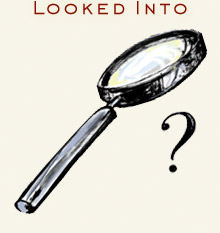Emdashes—Modern Times Between the Lines
The Basics:
About Emdashes | Email us
Ask the Librarians
Best of Emdashes: Hit Parade
A Web Comic: The Wavy Rule
Features & Columns:
Headline Shooter
On the Spot
Looked Into
Sempé Fi: Cover Art

And because the web is eternal, one link is from 2000. Which one? This interview with Susan Orlean on Powells.com about The Orchid Thief and redheaded girls, among other things:
Orlean: The Internet didn't exist when I left Portland. I'm beginning to feel like I shouldn't say that anymore because it makes me sound so old.
Dave Weich: When did you leave?
Orlean: 1983. We didn't work on computers at Willamette Week, that's for sure. People thought it was a principled stand. I'm not going to work on computers! That's bad!
...
Dave: Part of the book's success stems from how informative or educational it is - I don't know what word to use without making it sound dry. That's been a problem when I've tried to explain it to people. I felt like I'd learned a lot, but at the same time, it's really entertaining. It's one of the fastest, page-turning books I've read in a long time, which is why I think it works so well: because it's neither one nor the other. It's both.
Orlean: Sometimes I think, Oh God, I don't want people to think they're learning. That's so boring! Why write about it if they could go and look up all the information at the library? Well, because they're not going to. Much the same way you could say, "Why read about the swamp when you could go see it?" Well, most people will never see it. And that's what I do for a living: I go see it and describe it.
Dave: You said writing helps you understand what you figured out. So what did you figure out?
Orlean: That you need to care deeply about something or you're going to feel lost in the universe. I've felt that from my stories before, but this really confirmed it. It's a deep instinct people have: to be able to make sense of this weird, chaotic experience of life, you have to figure out some order, some logic, something to desire. Otherwise, why wake up in the morning?
At the same time, I thought maybe that instinct was disappearing, that people are just too cynical nowadays to feel devoted to something. So maybe it didn't apply anymore. Look at me: I didn't think I was particularly devoted. I love my family and my friends - it's not that I don't care about things - but I don't identify so strongly with any one thing.
I was pleasantly surprised to realize toward the end of this process that that was entirely untrue. Not just a little bit untrue, but so wildly untrue that the obviousness of it caught me up short. I'm madly passionate about my work. There's something really important about doing it well, doing it right, and being able to say to someone, "Come read this book. It's about orchids, but it's not really about orchids." That meant so much to me that I was willing to be quite uncomfortable, walking in the swamp, and to be lonely, away from home.
It struck me as almost hilarious to suddenly think, How could I have been so oblivious? Yes, I'm cynical and skeptical. I'm not a joiner. I don't see myself fitting in to some niche. But it was exhilarating to think, Oh, this isn't so strange to me. I get it.
And this one's brand-new: a satisfying, sweet NPR interview with John McPhee ("A familiar name, but a rarely seen face"), John McPhee: A Reporter's Reporter. From the NPR site:
John McPhee has written at length about fish, geology, oranges, nuclear power, basketball... and the list goes on.
At 75, the prolific journalist feels he has plenty of words, characters and subjects left to explore. He has already published 27 works of non-fiction. His long pieces in The New Yorker are treasured by his many fans.
A shy man, McPhee shuns most interviews and doesn't much like having his photo taken. But he connects deeply with his subjects. His latest book is Uncommon Carriers, a collection of stories about freight... and like all of McPhee's best work, about the people involved with sorting it, flying it, floating it and trucking it.
Special features: a 1978 interview with McPhee and Howard Berkes on "A Sense of Where John McPhee Is." Not that you can really tell on the radio, with all those clever sound effects. Here's a New Yorker Q. & A. from last year with McPhee and Matt Dellinger.



